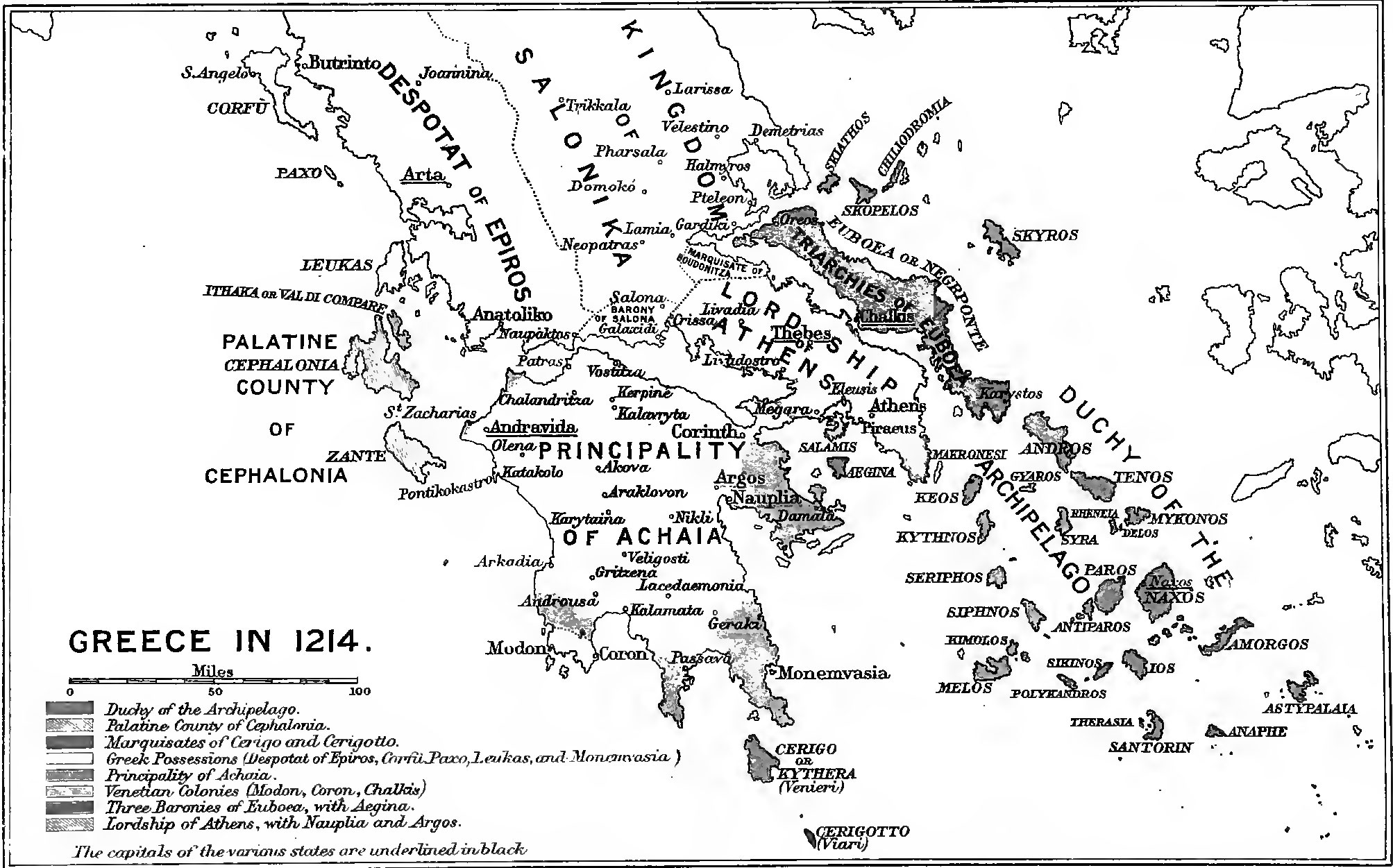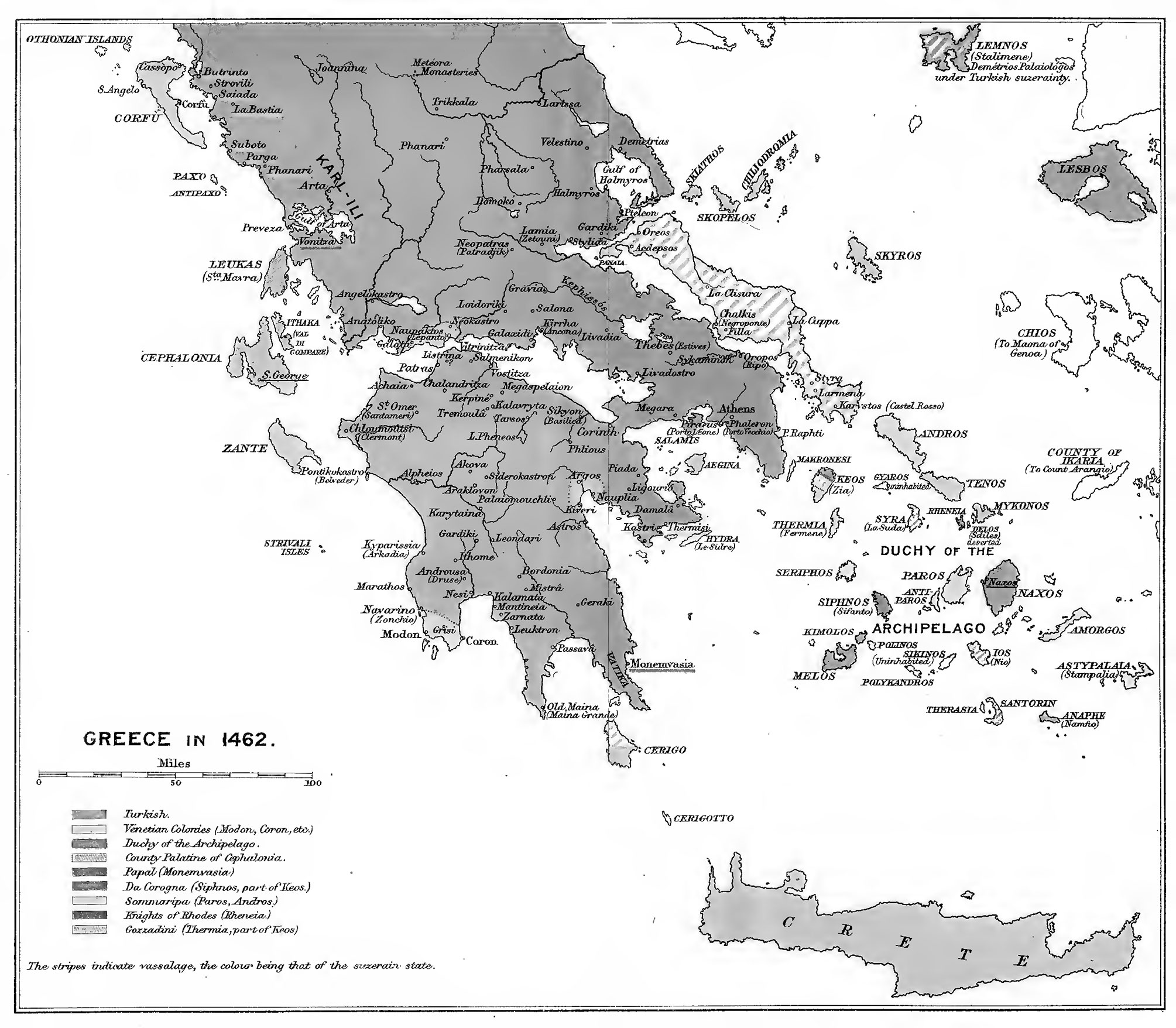 |
MEDIEVAL HISTORY LIBRARY
THE LEVANT
A HISTORY OF
FRANKISH GREECE
(1204-1566)
WILLIAM MILLER
CHAPTERS
PDF-The History of the Maritime Wars of the Turks
PDF. THE HISTORY OF THE ISLAND OF CORFU
PREFACE
PROFESSOR Krumbacher says in his History of Byzantine Literature, that, when he announced his
intention of devoting himself to that subject, one of his classical friends
solemnly remonstrated with him, on the ground that there could be nothing of
interest in a period when the Greek preposition cnro governed the accusative
instead of the genitive case. I am afraid that many people are of the opinion
of that orthodox grammarian. There has long prevailed in some quarters an idea
that, from the time of the Roman Conquest in 146 B.C. to the day when
Archbishop Germanos raised the standard of Independence at Kalavryta in 1821,
the annals of Greece were practically a blank, and that that country thus
enjoyed for nearly twenty centuries that form of happiness which consists in
having no history. Forty years ago there was, perhaps, some excuse for this
theory: but the case is very different now. The great cemeteries of mediaeval
Greece, I mean the Archives of Venice, Naples, Palermo, and Barcelona—have
given up their dead. We know now, year by year, yes, almost month by month—the
vicissitudes of Hellas under her Frankish masters, and all that is required now
is to breathe life into the dry bones, and bring upon the stage in flesh and
blood that picturesque and motley crowd of Burgundian, Flemish, and Lombard
nobles, German knights, rough soldiers of fortune from Cataluña and Navarre,
Florentine financiers, Neapolitan courtiers, shrewd Venetian and Genoese
merchant princes, and last but not least, the bevy of high-born dames, sprung
from the oldest families of France, who make up, together with the Greek
archons and the Greek serfs, the persons of the romantic drama of which Greece
was the theatre for 250 years. The present volume is an attempt to accomplish
that delightful but difficult task.
Throughout I have based the narrative upon first-hand
authorities. I can conscientiously say that I have consulted all the printed
books known to me in Greek, Italian, Spanish, French, German, English, and
Latin, which deal in any way with the subject; and I have endeavoured to focus
all the scattered notices concerning the Frankish period which have appeared in
periodical literature, and in the documents of the epoch which have been
published. These I have supplemented by further research in the archives of
Rome and Venice. My aim has been to present as'complete an account as is
possible in the existing state of our knowledge of this most fascinating stage
in the life of Greece. I have also visited all the chief castles and sites
connected with the Frankish period, believing that before a writer can hope to
make the Franks live on paper, he must see where they lived in the flesh.
Enormous as is the debt which every student of mediaeval Greek history owes to
the late Karl Hopf, it was here that he failed, and it was hence that his
Frankish barons are labelled skeletons in a vast, cold museum, instead of human
beings of like passions with ourselves.
One word as to the arrangement of the book. The
historian of Frankish Greece is confronted at the outset with the problem of
telling his tale in the clearest possible manner. He may describe, like Finlay,
the history of each small state separately—a course which not only involves
repetition, but prevents the reader from obtaining a view of the country as a
whole; or he may, like Hopf, combine the separate narratives in one—a policy
which inevitably leads to confusion. I have adopted an intermediate course. The
three states of the Morea and continental Greece—the principality of Achaia,
the duchy of Athens, and the Despotat of Epiros—were so closely connected as to
form a fairly homogeneous whole; and with them naturally go the island county
of Cephalonia and the island of Euboea. The duchy of the Archipelago and the
Venetian colony of Corfu, on the other hand, form separate sections, for their
evolution differed widely from the other states. I have therefore treated them
apart. Crete I have omitted for two reasons: it is not yet a part of the Greek
kingdom, and it so happens that Frankish Greece almost exactly coincided with
the area of modern Greece; moreover, the history of Venetian Crete cannot be
written till the eighty-seven volumes of the “Duca di Candia” documents at
Venice are published.
I owe thanks to many friends for help and advice,
especially to K. A. M. Idromenos of Corfu.
W. M.
ROME, December 1907.
|
 |







